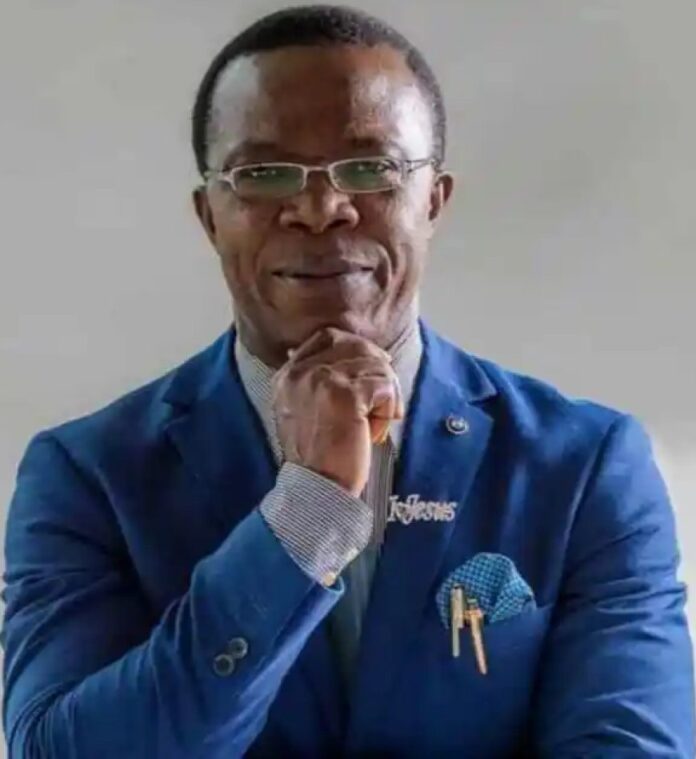Renowned Nigerian businessman and founder of the Coscharis Group, Cosmas Maduka, has stated that if Peter Obi, the Labour Party’s presidential candidate, had won the 2023 election, his administration would have followed the same economic policies as the current government. Maduka’s remarks, made during an interview on the Mic On Podcast with Okinbaloye via YouTube, come amidst growing discussions about Nigeria’s economic challenges and future direction.
Maduka, who is known for his successful business empire, said that key policies, such as the controversial removal of the fuel subsidy, would have been implemented by any government, including one led by Peter Obi. According to Maduka, despite the criticisms surrounding subsidy removal and its impact on the common people, the policy was inevitable for the country’s economic progress.
During the interview, Maduka was asked whether Peter Obi would have done anything differently had he been elected president. His response was clear: “No. He would have removed subsidy from day one also.”
This statement comes in the wake of ongoing debates about the fuel subsidy removal, which was a major policy change under President Bola Tinubu’s administration. The decision, while controversial, was framed as a necessary step to improve the country’s economy and redirect the funds previously spent on subsidies towards critical sectors such as infrastructure and social development.
Maduka’s assertion that Obi would have followed the same course of action highlights the complexity of Nigeria’s economic situation, where any government would have faced pressure to address the subsidy issue in order to free up funds for development.
In addition to discussing subsidy removal, Maduka also touched on the broader economic challenges facing Nigeria, particularly the rising value of the naira and the struggles of the average Nigerian. Although acknowledging the difficulties of speaking as a wealthy individual, he stressed the need for the government to reinvest the savings from subsidy removal into infrastructure development.
“The government should be more disciplined to use the money they have removed in the subsidy to put it in infrastructure so that people that you have taken from, those who have been flying private jets from subsidy money, their businesses fall,” Maduka explained. “But if you collect that money from them and put it in ventures that favour the general public, then there is progress.”
His comments reflect a belief that Nigeria’s economic prosperity lies in improving the country’s infrastructure, including roads, power supply, and transportation networks. By doing so, he believes that the government can help lift the burden on the average citizen, who faces rising costs due to the removal of the subsidy.
However, Maduka cautioned that without proper investment in productive sectors, the country could remain in a state of stagnation. “If you move from one tomb to another, you are still in the same graveyard. You haven’t gone anywhere,” he remarked, underscoring the importance of meaningful change through strategic investments.
Maduka also shared his views on Nigeria’s rising national debt, stressing that borrowing itself is not inherently bad, but the purpose for which funds are borrowed is crucial. He pointed out that borrowing for capital development, particularly in infrastructure, could lead to long-term benefits, as these investments would eventually pay off by fostering economic growth.
“The borrowing of a country is not a problem. What is the problem; Are you borrowing for capital development? Are you borrowing for infrastructural development? Because it will pay back itself,” Maduka explained. “But if you are borrowing to take a second wife, if you are borrowing to share money for poverty alleviation, you are deepening the hole that, after we get inside, nobody can bring us out.”
Maduka also highlighted the importance of fiscal discipline in governance, calling on the Nigerian government to ensure that spending is controlled and directed towards projects that will benefit the masses. He explained that excessive spending and misallocation of resources are major barriers to progress and that the government must adopt a more disciplined approach to managing the country’s finances.
“There is some level of discipline that is required to curtail excesses from the government,” he said. “Are we in the right direction? Yes.” His confidence that Nigeria is moving in the right direction, despite the challenges, comes from his belief that the government must focus on infrastructure, economic diversification, and poverty alleviation through careful resource allocation.
Maduka’s interview sheds light on the complex reality of governance in Nigeria, where economic reforms, such as the subsidy removal and efforts to reduce debt, can have a significant impact on citizens’ daily lives. While such measures may be unpopular in the short term, Maduka believes that they are necessary for long-term stability and growth.
The businessman’s perspective also highlights the difficulty of balancing the demands of economic reform with the need to address widespread poverty and inequality. The removal of subsidies, for example, has led to higher fuel prices and increased transport costs, which have placed additional strain on Nigerians already struggling with inflation and rising costs of living.
Despite these challenges, Maduka expressed optimism about Nigeria’s future, arguing that with the right leadership and disciplined financial management, the country can overcome its economic difficulties and chart a path towards greater prosperity.
“I am not saying that there won’t be pain in the process,” Maduka said. “But Nigeria must face the reality that without these difficult decisions, we cannot move forward.”

